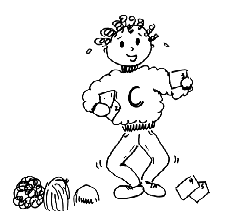Diet, Exercise, Sleep & Stress Relief for Students
Your college life will be more rewarding if you learn to work in healthy habits into your routine. Here are some basic students health tips to help you feel your best.
College is bad for your health! Students feel way too busy to eat right, exercise, and get enough sleep. On top of that, universities are jam packed with germs galore.
So how do you stay healthy on a college campus? You're busy, so if you're not the perfect model of good health, don't beat yourself up! The trick is to incorporate small, healthful habits into your campus life. By doing so, you'll feel better both physically and emotionally and will be better able to navigate the stressful college experience.
1. Get enough sleep.
When it comes to balancing busy schedules, students tend to put sleep low on their list of priorities. Don't do this. Some people can function on three or four hours of sleep per night, but most people cannot. Without sleep, you're not going to be able to concentrate well enough to get the most out of your classes. If you can't always get a good night sleep, work regular naps into your schedule.
2. Sleep on a regular schedule.
This can be hard for a college student. You may find yourself getting up early three days a week for your morning class and sleeping in until noon on the weekends. As much as possible, though, try to stick to a regular sleeping pattern. Also, try to go to sleep relatively early.
3. Eat sensibly.
College students often gain weight due to late night eating and overindulgence of junk food. Here are some tips on how to avoid the Freshman Fifteen, and some college dining hall health tips.
4. Eat breakfast.
Skipping breakfast contributes to weight gain. It also will make it hard for you to concentrate in class. You don't have to eat a big breakfast; a bowl of cereal or a cup of yogurt will make you a happier and healthier human being.
5. Eat enough.
Many students have problems with eating disorders, which can be deadly. If you have serious issues with food, seek help at the campus counseling center immediately. Here is some information about college students and eating disorders.
6. Drink water.
Most people do not get nearly enough water. Resist the lure of soda machines and the unlimited soda at the dining hall and get into the habit of drinking water. Get a water bottle and carry it around with you.
7. Don't binge drink.
Excessive drinking can lead to addiction or alcohol poisoning. But there's one undesirable effect of binge drinking that doesn't get talked about as much: it makes you gain weight! Some students deprive themselves of food during the week so that they can binge drink on the weekends without gaining weight, which is a bad idea. Here is some important information about college student alcohol safety.
8. Work in walking.
You're on a college campus, so take full advantage of walking opportunities! Even if you have a car, make walking your main form of transportation on campus.
9. Get a bicycle.
If you go to school somewhere with a decent climate, travel around campus on a bike. Just remember: get a bike helmet and protective gear too, and ride with caution. Most college students ride bikes responsibly, but there's always a few that make drivers question the future of the species.
10. Spend time at the student recreational center.
A big chunk of your student fees is going to the gym, so take advantage of it! Find an activity that you like, or take a class. You don't need to spend hours and hours working out to feel the benefits. Just remember: don't use the gym as a form of procrastination!
11. Get regular checkups.
Your parents probably took care of this for you, but now it's up to you make sure you see a doctor regularly. You're probably entitled to an annual exam at the student health center. Ladies, you're probably entitled to an annual gynecological exam, which you need to start doing now, especially if you're sexually active.
12. Get a flu shot.
Many schools offer them at low cost. College campuses are absolute cesspools of germs, so take this simple step to help protect yourself.
13. Learn to relax.
This can be a difficult goal for a college student, but do your best. Learn to put things in perspective. If you get a C on that test you're freaking out about, nothing catastrophic will happen. If your school has a stress management course or exercise courses such as yoga, sign up.
14. Get mental counseling if you need it.
Take advantage of the counseling services on campus. College students frequently suffer from anxiety, depression, eating disorders, addiction, and homesickness and student counseling services are usually well equipped to help with these issues.


















